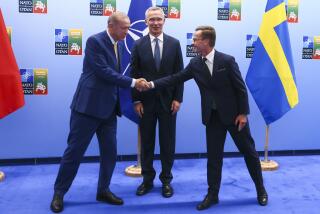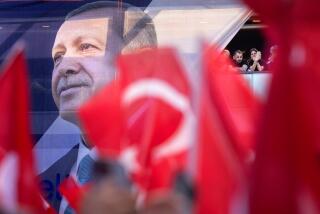U.S. Intends to Spend Millions on Turkish Bases
- Share via
BRUSSELS — The Bush administration is planning to spend “hundreds of millions” of dollars preparing bases in Turkey for U.S. and allied planes and equipment, Deputy Defense Secretary Paul D. Wolfowitz said Wednesday, as American officials appeared poised to press the key ally to host large numbers of troops in the event of a war with Iraq.
Having secured a pledge from Turkey’s newly elected government this week to open some of the nation’s ports and air bases to the gathering U.S.-led coalition, Pentagon planners are now identifying what bases they would need for an attack on Turkey’s southern neighbor and what it would take to upgrade them.
“We’re going to go now immediately into very concrete discussions about what facilities might be used, what forces might be employed on them, how much money needs to be invested to bring them to the level that we need,” Wolfowitz said before leaving the Turkish capital, Ankara. He was on his way to NATO headquarters in Brussels to seek broader support for a campaign against Iraq.
“We’re talking potentially about tens of millions -- probably several hundred million dollars -- of investment in various facilities we might use.”
Officials traveling with Wolfowitz said the improvements would not affect the start date of any war with Iraq but that if the upgrades were done on the fly, as was done elsewhere during the Afghan campaign, the situation would be less than optimum.
In Washington, officials also stressed that the planned upgrading was unlikely to affect U.S. war planning.
“The notion that it could affect our war plans is inconceivable to me,” said a senior U.S. military official Wednesday, speaking on the condition of anonymity. “I just could not imagine that it would take that much time.”
The administration has courted the leader of Turkey’s new Islamic-rooted ruling party, Recep Tayyip Erdogan, who has reluctantly embraced the U.S.-led military buildup despite broad opposition among the Turkish public to any military action in Iraq. Despite leading the Justice and Development Party, Erdogan has not been allowed to serve as prime minister because he was barred from office after being convicted of “religious sedition” in 1998. Negotiations to give him the title are ongoing.
Wolfowitz pleased Turkish leaders during his visit with suggestions that Turkey would gain financial and military aid for supporting the anti-Iraq coalition, but the Turks expressed strong reservations about large numbers of U.S. troops on their soil.
Because of public concern over talk of war in Iraq, “it may be difficult to see tens of thousands of American forces being transported through the Turkish territory into Iraq,” Turkish Foreign Minister Yasar Yakis told reporters in Ankara on Tuesday.
Nevertheless, Pentagon planners are expected to press Turkey to allow tens of thousands of coalition troops on its soil in order to prepare for a multi-pronged attack on Iraq from the north, south and west.
Qatar and Kuwait are expected to host U.S. troops in the south, and to the south and west, Saudi Arabia has agreed to allow coalition warplanes to use its airspace and the Prince Sultan Air Base southeast of Riyadh, the capital. But the Americans have few options to the north.
“Obviously, if we’re going to have significant ground forces, this is the country they’re going to have to come to,” Wolfowitz told reporters traveling with him in Ankara. “There is no other option.”
Getting a green light from the Turkish government on the bases allows the Pentagon to move ahead with military planning that has been in a “holding pattern” while Turkey’s new leaders were preparing to take office, he said.
The ability to fly U.S. warplanes out of Turkey is crucial to waging a successful campaign against Iraq, military analysts have said. With only a handful of air bases available to U.S. forces in countries to Iraq’s south, it would mean that planes flying out of Turkey could well represent more than a third of the total air power during an Iraq campaign, they say.
The U.S. has two air bases in Kuwait, one in Qatar and one in Oman from which it would be able to fly combat missions into Iraq. Air bases in Saudi Arabia are likely to be used only for support aircraft such as tanker planes and for search and rescue operations.
In addition, the U.S. has five aircraft carriers that could be moved into the region at any one time to provide seaborne air bases for fighter jets and helicopters.
“A fundamental difference between this war and the last war is that the last time they were mainly dropping bombs on stuff in and around Kuwait,” said John Pike, director of GlobalSecurity.org, a defense think tank. “The focus of the air campaign this time is Baghdad. Baghdad is in the middle of the country, and Turkey is close by. Turkey is a heck of a lot closer to Baghdad than Oman is.”
The Turkish bases are modern facilities built and outfitted to fulfill Turkey’s obligations as a member of NATO, which makes them far superior to the airstrips in Central Asia that the U.S. upgraded over several months to handle planes flying in the Afghanistan campaign.
Wolfowitz still must contend with the Turks’ belief that using force to enforce the United Nations resolution requiring Iraq to disclose and give up chemical, biological and nuclear weapons would require a second action within the U.N. Security Council.
While the original resolution does not automatically authorize force, Wolfowitz said, it requires only a meeting of the Security Council and not necessarily another formal resolution. But U.S. officials hope to iron out any potential disagreement with the Turks in coming weeks.
“There are different views, I think, among Turks and ... within the government. It is an important question and one I think we need to clarify at the highest levels of both governments,” Wolfowitz said.
Seeking to press the new Turkish government for firm commitments quickly, Wolfowitz, during a late dinner Tuesday, extended an invitation from President Bush to Erdogan to visit the White House.
The Bush administration has offered a number of inducements to its key Muslim ally, including campaigning for Turkey in the nation’s effort to get the European Union to set a date to discuss Ankara’s request for admission.
Wolfowitz lobbied British officials in London on Monday to approve a plan that ties Turkey’s request for a date for the EU to consider its membership with a request by Cyprus to join.
With Turks still suffering economic losses from the 1991 Persian Gulf War, illustrated by sidelined diesel trucks unable to carry their freight across the border to Iraq because of international sanctions, U.S. envoys are discussing direct financial aid, compensation for basing help and continued support of Turkey’s requests for aid from the International Monetary Fund.
On Wednesday, Wolfowitz met with George Robertson, secretary-general of the North Atlantic Treaty Organization, and other European officials. While the Bush administration is not expected to ask NATO to play a direct role in any conflict with Iraq, U.S. policymakers are seeking some military support from individual members.
British defense authorities, who are expected to contribute combat troops, have agreed to every request their American counterparts have made, a senior U.S. official said.
Wolfowitz met Monday with British Prime Minister Tony Blair and Defense Minister Geoff Hoon.
*
Times staff writer Esther Schrader in Washington contributed to this report.
More to Read
Sign up for Essential California
The most important California stories and recommendations in your inbox every morning.
You may occasionally receive promotional content from the Los Angeles Times.













